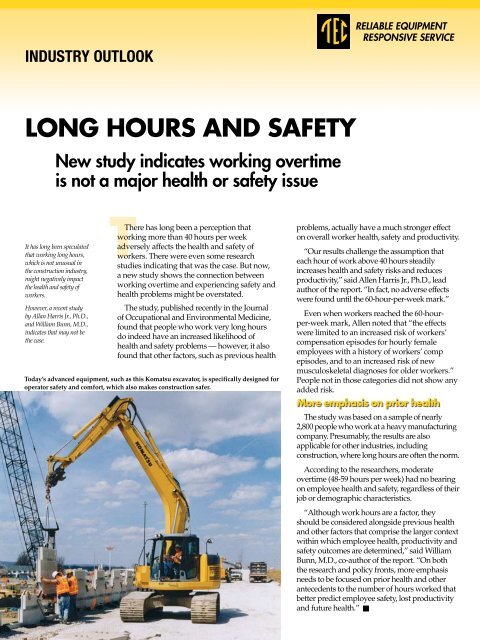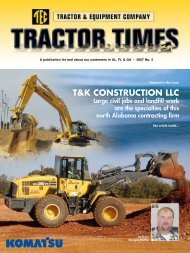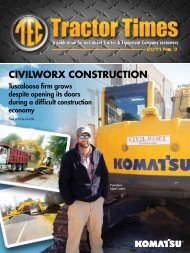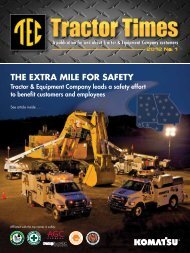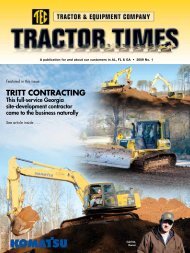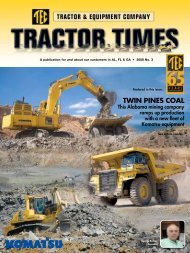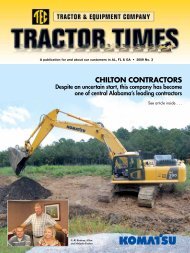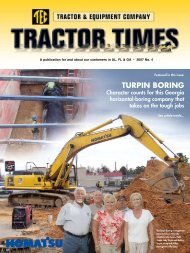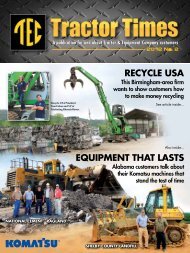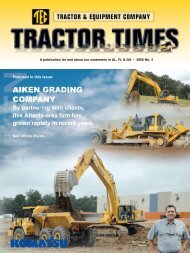EARTHWORKS GRADING & CONCRETE - TEC Tractor Times
EARTHWORKS GRADING & CONCRETE - TEC Tractor Times
EARTHWORKS GRADING & CONCRETE - TEC Tractor Times
Create successful ePaper yourself
Turn your PDF publications into a flip-book with our unique Google optimized e-Paper software.
INDUSTRY OUTLOOK<br />
RELIABLE EQUIPMENT<br />
RESPONSIVE SERVICE<br />
LONG HOURS AND SAFETY<br />
New study indicates working overtime<br />
is not a major health or safety issue<br />
It has long been speculated<br />
that working long hours,<br />
which is not unusual in<br />
the construction industry,<br />
might negatively impact<br />
the health and safety of<br />
workers.<br />
However, a recent study<br />
by Allan Harris Jr., Ph.D.,<br />
and William Bunn, M.D.,<br />
indicates that may not be<br />
the case.<br />
There has long been a perception that<br />
working more than 40 hours per week<br />
adversely affects the health and safety of<br />
workers. There were even some research<br />
studies indicating that was the case. But now,<br />
a new study shows the connection between<br />
working overtime and experiencing safety and<br />
health problems might be overstated.<br />
The study, published recently in the Journal<br />
of Occupational and Environmental Medicine,<br />
found that people who work very long hours<br />
do indeed have an increased likelihood of<br />
health and safety problems — however, it also<br />
found that other factors, such as previous health<br />
Today’s advanced equipment, such as this Komatsu excavator, is specifically designed for<br />
operator safety and comfort, which also makes construction safer.<br />
problems, actually have a much stronger effect<br />
on overall worker health, safety and productivity.<br />
“Our results challenge the assumption that<br />
each hour of work above 40 hours steadily<br />
increases health and safety risks and reduces<br />
productivity,” said Allen Harris Jr., Ph.D., lead<br />
author of the report. “In fact, no adverse effects<br />
were found until the 60-hour-per-week mark.”<br />
Even when workers reached the 60-hourper-week<br />
mark, Allen noted that “the effects<br />
were limited to an increased risk of workers’<br />
compensation episodes for hourly female<br />
employees with a history of workers’ comp<br />
episodes, and to an increased risk of new<br />
musculoskeletal diagnoses for older workers.”<br />
People not in those categories did not show any<br />
added risk.<br />
More emphasis on prior health<br />
The study was based on a sample of nearly<br />
2,800 people who work at a heavy manufacturing<br />
company. Presumably, the results are also<br />
applicable for other industries, including<br />
construction, where long hours are often the norm.<br />
According to the researchers, moderate<br />
overtime (48-59 hours per week) had no bearing<br />
on employee health and safety, regardless of their<br />
job or demographic characteristics.<br />
“Although work hours are a factor, they<br />
should be considered alongside previous health<br />
and other factors that comprise the larger context<br />
within which employee health, productivity and<br />
safety outcomes are determined,” said William<br />
Bunn, M.D., co-author of the report. “On both<br />
the research and policy fronts, more emphasis<br />
needs to be focused on prior health and other<br />
antecedents to the number of hours worked that<br />
better predict employee safety, lost productivity<br />
and future health.” n


